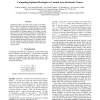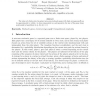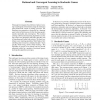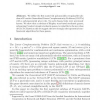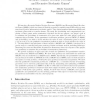147
click to vote
AAAI
2012
13 years 4 months ago
2012
Significant progress has been made recently in the following two lines of research in the intersection of AI and game theory: (1) the computation of optimal strategies to commit ...
144
click to vote
FSTTCS
2010
Springer
15 years 2 days ago
2010
Springer
We study the computational complexity of basic decision problems for one-counter simple stochastic games (OC-SSGs), under various objectives. OC-SSGs are 2-player turn-based stoch...
153
click to vote
AI
2002
Springer
15 years 1 months ago
2002
Springer
Learning to act in a multiagent environment is a difficult problem since the normal definition of an optimal policy no longer applies. The optimal policy at any moment depends on ...
135
click to vote
SIAMCO
2008
15 years 2 months ago
2008
Abstract. In this paper we consider a class of hybrid stochastic games with the piecewise openloop information structure. These games are indexed over a parameter which represents...
118
click to vote
CORR
2008
Springer
15 years 2 months ago
2008
Springer
The value of a finite-state two-player zero-sum stochastic game with limit-average payoff can be approximated to within in time exponential in a polynomial in the size of the gam...
145
click to vote
UAI
2000
15 years 3 months ago
2000
Stochastic games generalize Markov decision processes MDPs to a multiagent setting by allowing the state transitions to depend jointly on all player actions, and having rewards de...
132
click to vote
IJCAI
2001
15 years 3 months ago
2001
This paper investigates the problem of policy learning in multiagent environments using the stochastic game framework, which we briefly overview. We introduce two properties as de...
130
click to vote
ERSHOV
2006
Springer
15 years 5 months ago
2006
Springer
Abstract. We define the first nontrivial polynomially recognizable subclass of P-matrix Generalized Linear Complementarity Problems (GLCPs) with a subexponential pivot rule. No suc...
127
click to vote
ICALP
2005
Springer
15 years 7 months ago
2005
Springer
We introduce Recursive Markov Decision Processes (RMDPs) and Recursive Simple Stochastic Games (RSSGs), which are classes of (finitely presented) countable-state MDPs and zero-su...
126
click to vote
ICALP
2007
Springer
15 years 8 months ago
2007
Springer
We propose axiomatizing some stochastic games, in a continuous state space setting, using continuous belief functions, resp. plausibilities, instead of measures. Then, stochastic g...
